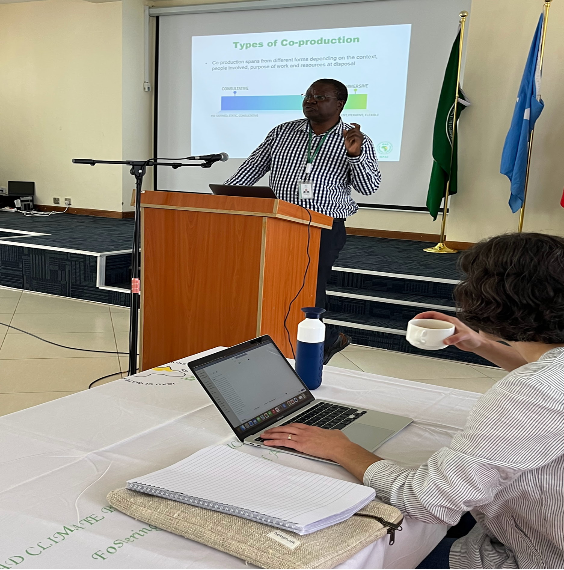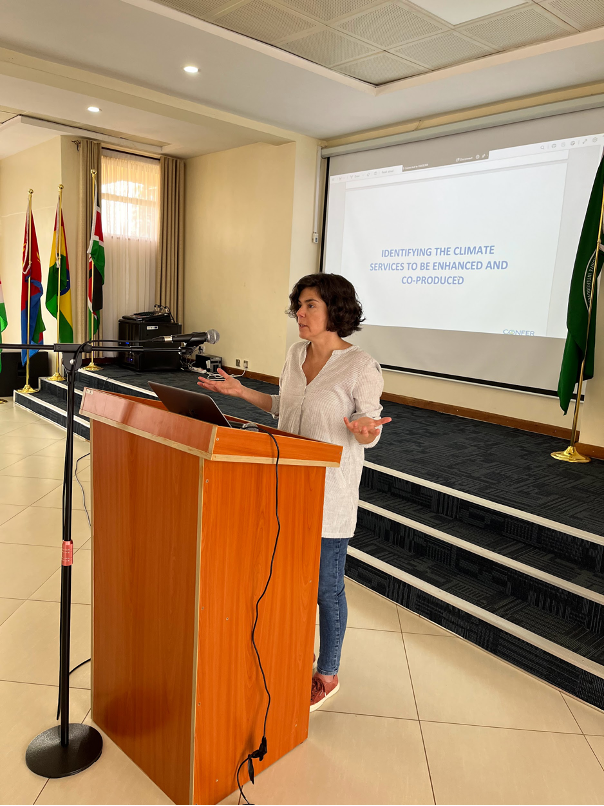Harnessing CONFER’s co-production experiences and opportunities
The article highlights the importance of selecting the right participants for GHACOF forums.

By Alexia Kioko
As the regional user interface platform takes shape, it is essential to reconsider the selection of participants for our regional forecast forums, as their input plays a pivotal role in the planning and decision-making process. We are venturing into a new approach to these forums, seeking to revitalize and innovate our methods.
The article highlights the importance of selecting the right participants for GHACOF forums. Effective co-production in climate services is a deliberate endeavor that necessitates careful planning. To achieve this, the WISER definition of Co-production, which encourages the collaboration of diverse knowledge sources and experiences to generate improved, context-specific knowledge, is employed. This knowledge is intended to support decision-making across various sectors, including agriculture, disaster risk management, and water.
Co-production can range from a consultative to an intensive process, and GHACOF65 offered a clear example of the latter. A noteworthy example of intensive co-production was witnessed during GHACOF65, where various organizations collaborated closely such as ICPAC, KenGen, and Kenya Meteorological Department (KMD). KenGen, East Africa’s leading clean energy producers, demonstrated how co-production can effectively shape the energy sector .
Framing is another crucial aspect to consider. How we frame NCOF or GHACOF is pivotal. It's vital to review how various sectors frame co-production in their projects, services, and MET products. Framing at the community, sub-national, and national levels differ significantly. Effective communication, such as the translation of GHACOF into multiple languages and involving local university researchers, is essential for widening the scope of discussions and forming research questions that may otherwise be overlooked.
During a WISER workshop in Nairobi, a synthesis guided the development of building blocks for the CONFER project. These building blocks ensure that every project adheres to specific principles. It's imperative to strengthen sector user interface platforms, fostering continuous dialogue, building climate literacy, enhancing sector-specific literacy, evaluating and monitoring product usage, and keeping climate products in line with sector requirements. It is also important to establish connections between sector-user interface platforms, which can be instrumental in upscaling and building capacity at regional and national levels to fulfill organizations' mandates.
The article discusses the Co-Production of climate services in the CONFER project. The primary goal of CONFER is to collaboratively develop climate services for the water, energy, and food security sectors, empowering stakeholders, and end-users to plan for and adapt to seasonal weather fluctuations. The co-production process involves a systematic literature review that identified significant research and studies primarily in Kenya, Ethiopia, and Uganda, with limited activity in countries like Eritrea, Burundi, Djibouti, and South Sudan. With a focus on agriculture, food security, disaster risk management, and capacity building at national and local levels. The findings emphasize the need for a balanced approach, extending support to underrepresented regions.
A comprehensive regional survey, covering all sectors across the 11 member state countries, played a pivotal role in shaping the direction of climate services development. The information acquisition process revealed that users heavily rely on ICPAC and National Meteorological Services for their data. Feedback indicated the need for more detailed, downscaled, and timely information, such as weekly, monthly, and seasonal forecasts.

The survey's outcomes led to the creation of work streams that are central to co-production efforts, spanning across sectors and focusing on agriculture, food security, and the water and energy sectors. These workstreams transcend all work packages, ensuring a comprehensive understanding of their case studies. Collaboration with colleagues from meteorological services in various countries has strengthened trust, collaboration, and knowledge sharing.
Effective co-production requires different approaches depending on the climate services in question. This involves engaging diverse stakeholders, employing varied engagement methods, and adopting different techniques to produce valuable products for end-users. Effective communication, in terms of language translation and establishing common ground with stakeholders, is essential. Managing expectations is also a key part of the solution, ensuring better management at organizations.
The regional survey revealed the need for new climate services and products, particularly in the agriculture and food security sector, as well as the water and energy sector. This emphasizes the importance of producing tailored climate products and services that address user needs.
For the GHACOF forums, consider broadening their stakeholder base within sectors, such as the health sector, by inviting research institutes to provide fresh insights into community challenges. This approach enables a wider range of ideas to be explored and reaches a more diverse audience. Furthermore, there's a need to evaluate whether the co-productions at GHACOF, which refers to bringing together different knowledge sources and experiences to jointly develop new, combined and relevant knowledge and systems to enable its intended use in decision-making, aligns with the definition provided by CONFER.
It appears that current practices primarily revolve around impact assessment, deviating from the intended definition. Efforts should actively seek ways to improve alignment. Regarding the new climate services and products highlighted, there are questions on whether some of these are genuinely new or need improvement. Clarity is essential in the release of forecasts, ensuring that the information provided three months before and after is specific and valuable, allowing for better preparation and a comprehensive overview of forecast performance.
In summary, the article highlights the critical role of co-production in shaping climate services, the need for strategic collaborations and communication, and the ongoing efforts to enhance these processes within organizations and the CONFER project.
